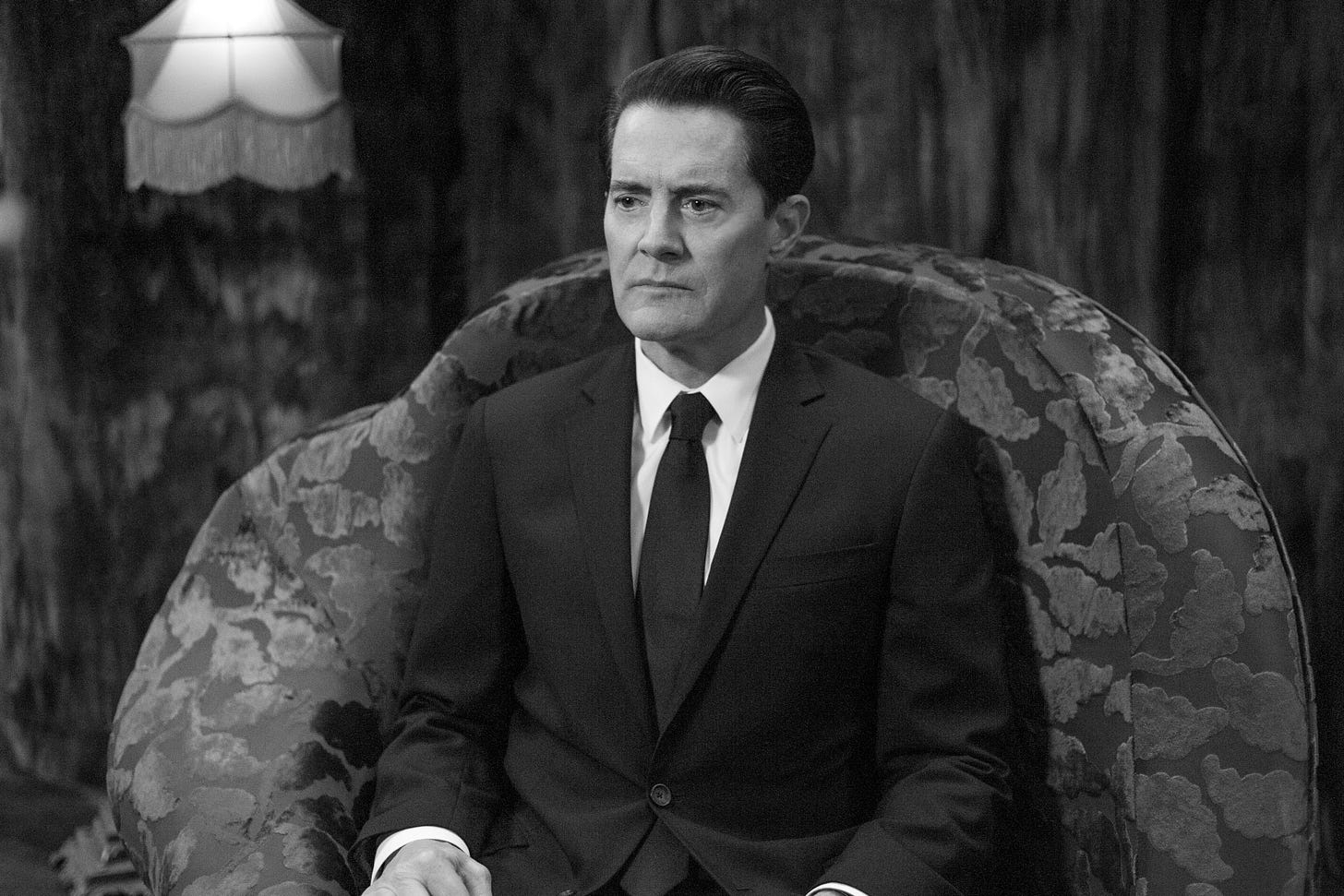Twin Peaks: The Return (2017) - Best of 2000-2019 Part 1
"My Favorite Films of the 21st Century So Far" series Part One, and The First of Five I wanted to highlight as the Best of the Best.
THE BEST OF THE BEST
The first five films I’ll post about are those that I felt should be separated from the rest. They’ve had an enduring intellectual, philosophical, and spiritual impact on my life and I feel that I’m better overall having seen and sat with them. I have about 20 movies to write up for the whole series, so I’ll be releasing my arguments for their greatness one by one. I’m shooting for a baseline of one a day, but may publish more if I’m feeling ~inspired~. There’s no particular order to these first five, not ranking anything here!
Twin Peaks: The Return (2017)
Director: David Lynch
Writer: David Lynch & Mark Frost
Cinematographer: Peter Deming
Music: Angelo Badalamenti, Dean Hurley, David Lynch
Yeah, I know, this is a television program. But David Lynch said he considers it an eighteen-hour-long movie so it’s on the list. This is the defining work of his career as far as I’m concerned. He finds comfort in old friends getting back together for the show, but rarely does he settle for fan-service or cheap “Remember this wacky moment???” nostalgia. It is in fact an examination of nostalgia, a reminder that while we may desperately want to go back twenty-five years and wrap ourselves up in the locations, characters, friends, family, etc. that we dearly miss, we never will. Time waits for no man; even Norma (Peggy Lipton) and Big Ed (Everett McGill) had to wait 25 years to consummate their love.
It is also a reflection on progress. Gordon Cole (David Lynch) retains his signature hearing aids but is surrounded by high tech equipment. Text messages convey critical plot points. And the neighborhood in which Dougie Jones/Cooper (Kyle MacLachlan) leaves his car seems totally deserted save for a junkie and her son in the house across the street. Rows and rows of identically abandoned suburban banalities, perhaps the result of the mass homeowner exodus following the economic disaster in 2008. Lynch is not a capital P “Political” filmmaker, but Janey-E’s (Naomi Watts) declaration that “we are the 99%” and Norma’s discomfort with turning the Double-R into a franchise imply a certain anti-corporate tendency in Lynch. It isn’t a socialist screed, it’s a rejection of the manner in which local culture and little people are flattened by the march of big money. Of course, technology saves the day with a perfectly timed cell phone call (your reading of parts 17 and 18 may vary, but I believe that sequence was meant to be real.)
This is a beautiful masterwork from one of our finest living directors. The central themes of love, community, and kindness abound. This is also the first real insertion into his work of Transcendental Meditation, a practice Lynch is deeply devoted to, with scenes dragged out many times longer than almost any other filmmaker would find appropriate. Watch a boy sweep up a barroom floor for ten minutes, watch two people drive on an empty road at nighttime for fifteen. Reflect and take it all in. We live inside a dream, but who is the dreamer?
What Lynch has done here is create an ode to his television classic that is at once an adoration and a parody. We can see how he loves his characters, especially Dale Cooper, and knows how beloved he is by the fan base. So, he puts him in a near vegetative state for the vast majority of the runtime! When our stalwart Special Agent finally comes to, we’re treated to the old FBI man in all his confidence, command, and control.
But then, after our hopes are miles high: “What year is this?”



I had a really hard time finishing Season 2... actually I havent finished it. I feel like all the characters aren't even the same anymore, story is nonsense (more than it was before) and it just didnt felt right. I know Lynch finished the 2 final episodes but i just couldn't get there... maybe i should try again